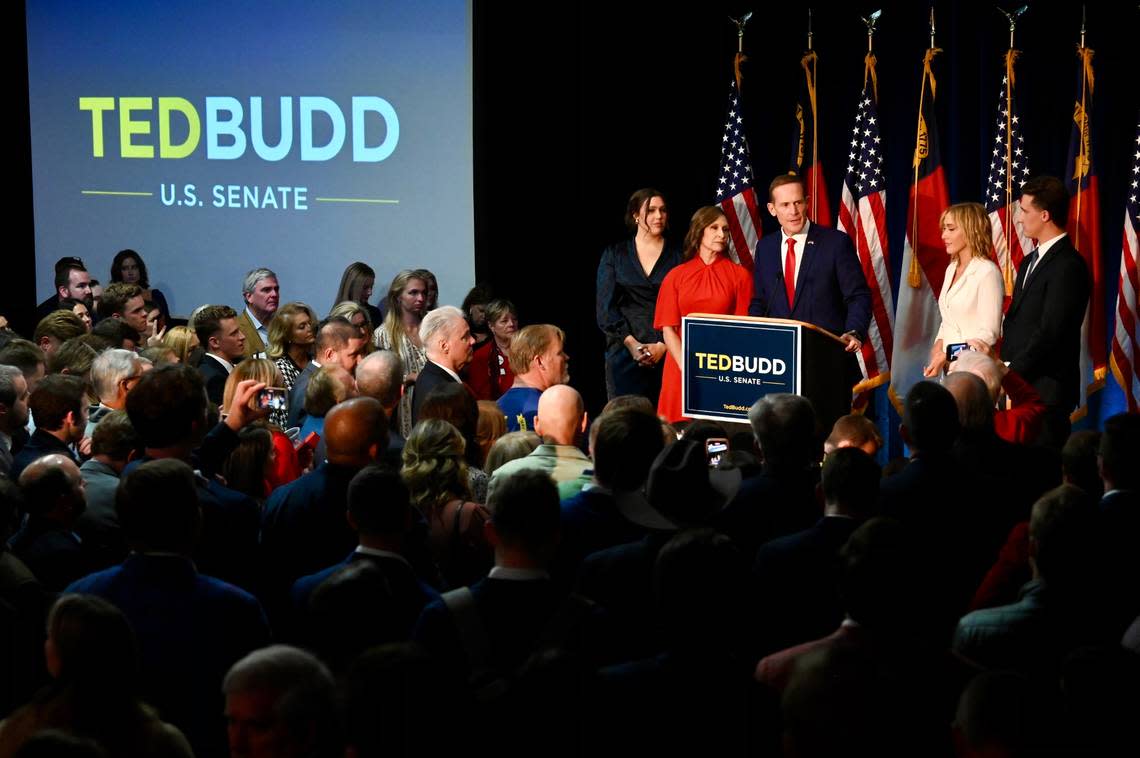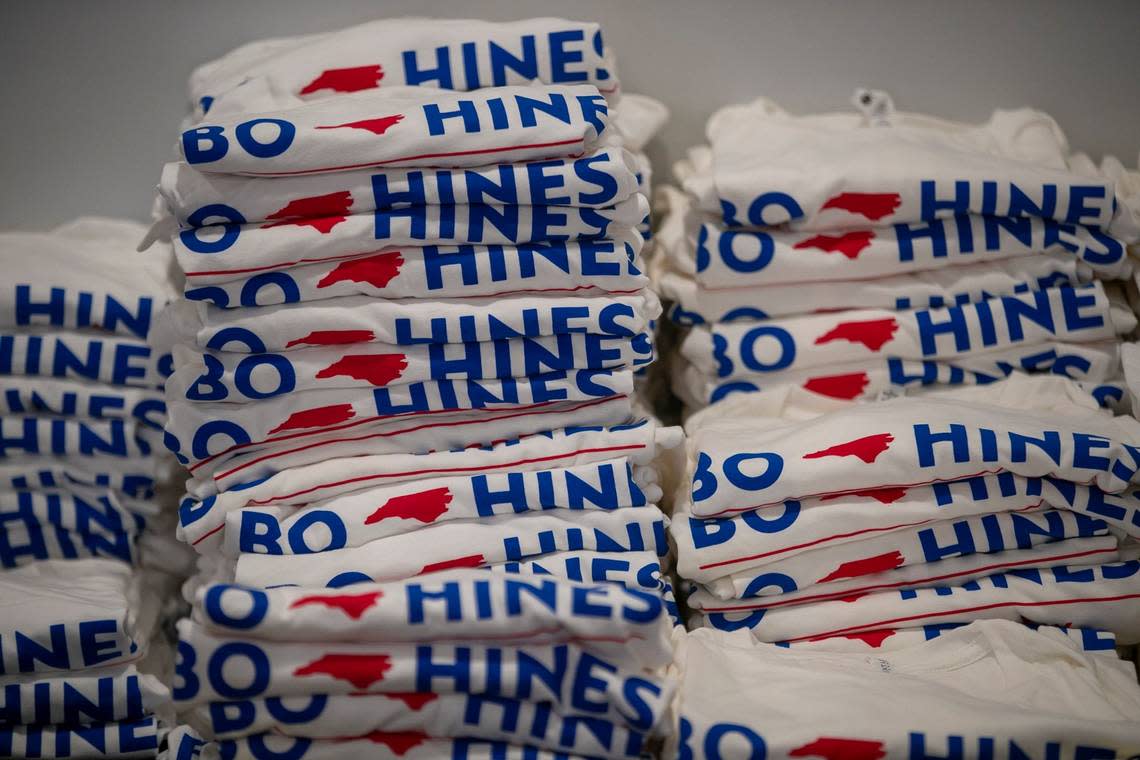Why some Trump-backed Republicans won in NC and others didn’t: Experts explain
North Carolina’s next U.S. senator, Ted Budd, made clear Tuesday night that “a sleepy campaign” is exactly what he needed to pull off a win.
Throughout the race between Budd, a Republican, and his Democratic opponent, Cheri Beasley, media outlets across the country labeled the race quiet or overlooked. There were few big controversies, and neither candidate had a personality that made news.
Former President Donald Trump endorsed Budd early in his campaign, which helped him pull off a victory in the primary, but general-election voters rejected many of Trump’s candidates Tuesday. Political scientists from across the state agreed that Budd’s discipline in staying quiet and keeping his messaging focused helped deliver him a win, when other candidates didn’t fare as well.
Jonathan Felts, Budd’s senior advisor, said the goal wasn’t to be “sleepy” but to be disciplined. Budd’s campaign wanted to stay on message and not get distracted, even when issues popped up between the two opponents that frustrated their team.
“It was our strategy to have a disciplined race,” Felts said. “We wanted to stay focused on talking about issues that voters cared most about and in that case this year, it was inflation, it was economic security, border security – even after the primary, border security stayed one of the top issues – and then eventually crime became a big issue.”
Felts said it helped that Budd is also a quality candidate who stayed focused on what he needed to do to win.
Political scientists from across the state agreed with that assessment.
“His campaign played the cards they were dealt very well,” said Chris Cooper, a professor at Western Carolina University. “This was going to be a good year for Republicans from the beginning and if you add that to a purple state you would expect that a mistake-free campaign will yield a clear victory, and that’s exactly what we saw.”
Pope “Mac” McCorkle, a professor at Duke University’s Sanford School of Public Policy and a former Democratic campaign consultant, said part of Budd’s success was running a more muted campaign.
“Ted Budd tried to act like Richard Burr’s fraternity brother, in many respects,” McCorkle said, “recede to the wall, don’t be crazy, be for Trump but try to keep that under wraps.
“And he succeeded at that.”

The economy and Biden
Felts said Budd’s 2022 strategy echoed that of his original campaign for the U.S. House in 2016.
“The reason Ted ran for office was he is a job creator,” Felts said. “He felt like we were missing job creators in the U.S. Congress and so for this campaign, we didn’t have to change his message from his original campaign.”
Budd’s father bought, in 1963, a failing janitorial supply company in Winston-Salem and expanded it into a janitorial, maintenance and landscaping company that employs thousands of people across the Southeast.
Ted Budd worked for his father’s company but has been an entrepreneur in his own right, trying his hand at several businesses, but currently owning Proshots, a gun store and shooting range in Rural Hall.
Pocketbook issues drove some voters to the polls this fall as they blamed Biden, and the Democratic Party by association, for rising costs at the gas pump and the grocery store. Throughout the campaign, Beasley distanced herself from Biden and his administration.
Jason Husser, a political science professor and director of the Elon University Poll, said Budd’s campaign used a campaign strategy political scientists call a “clarifying campaign.”
“He primarily focused on messages that clarified the current state of the economy and tried to attribute that to President Biden,” Husser said. “The counterpart to that is an insurgent campaign which tries to redirect the focus to things that are noneconomic or not about evaluating the state of the world, and we typically see that dichotomy come up when times are bad and there’s an incumbent. People against the incumbent will run these clarifying campaigns.”
Husser said if times were good right now and the economy was surging, Budd would need to focus on issues that rally voters emotionally, and that’s what Beasley’s campaign did.
“I think, if we weren’t in such a high-inflation context, the whole conversation of this race would be very different,” Husser said.
The Trump factor
Another strategy the Budd campaign used was an endorsement from Trump.
The former president surprised North Carolina’s Republican Party when he endorsed Budd over both former Gov. Pat McCrory and former U.S. Rep. Mark Walker. McCrory and Walker were thought to be the party favorites in the primary, but Trump’s approval shot Budd past both of his competitors and won him the Republican nomination.
“When we announced we had multiple campaign plans when we started: one that would have gone with Trump’s endorsement but one that would not have followed a Trump endorsement,” Felts said. “We ran a much different campaign with the Trump endorsement than we would have, obviously, without it, and that allowed us a much more direct path to victory.”

An endorsement was clearly beneficial to Budd in the primary, but there was speculation once he got to the general election on whether it would turn away moderate Republicans and undecided voters.
For Asher Hildebrand, an associate professor at the Sanford School of Public Policy, it was not a good election for Trump-backed candidates.
“There’s no question this was a bad election for Donald Trump,” said Hildebrand, a Democrat. “With the possible exception of Kari Lake in Arizona and Herschel Walker in Georgia, every governor and Senate candidate he endorsed in five main battleground states appears to have lost.”
He added that Trump seems to have motivated Democratic voters and “his presence kind of looming over the election prevented some independent and even Republican voters who voted Democratic in 2018 and 2020 from coming back into the Republican fold.”
“There’s also some evidence that voters cared about democracy when they went to the polls in a way that they hadn’t before, and that President Biden’s decision to campaign on these issues, which was criticized by me at the time, was actually smart politics,” Hildebrand said.
But in Budd’s camp, that was far from a worry.
“We were never overly concerned about whether a Trump endorsement would hurt us in the general election,” Felts said, adding that North Carolina gave Trump victories in both 2016 and 2020.
He added that their plan was never to lean into the Trump endorsement, but to focus on issues that mattered to voters.
McCorkle noted that Budd and Beasley’s results closely resembled those of Trump and Biden’s race in 2020, though Beasley did not get as strong of support as Biden did in big cities in North Carolina. Budd did as well or better than Trump across metropolitan counties near those big cities, he said.
In unofficial and incomplete results, Budd received 50.71% of the votes and Beasley got 47.08%. Beasley lost by 135,626 votes.
In 2020, Trump won 49.93% of the votes in North Carolina and Biden got 48.59%. Biden lost by 74,483 votes.
Backed by Cawthorn and Trump
Tuesday night handed defeats to Republicans Bo Hines and Sandy Smith.
Hines, 27, ran against state Sen. Wiley Nickel to represent North Carolina’s 13th Congressional District in the Triangle. Smith, 48, faced off against Democratic state Sen. Don Davis to represent the 1st Congressional District that encompasses 19 counties in the northeast.

Nickel flipped a Republican-held congressional seat.
Hines won 48.68% of votes to Nickel’s 53.32%, a loss by 140,531 votes in unofficial results.
“Our campaign message is one of standing up to the extremes of both parties to do what’s right, whether that’s the far left or the far right, going to Washington to represent everyone in this district,” Nickel said. “You certainly never heard anything about representing everybody from our opponent.
Nickel also said he focused on a positive message during his campaign and pushed ideas on how to help people struggling economically. Hines showed he was “not going to compromise on anything” or work across the aisle, Nickel said.
Hines was “incredibly tied to Donald Trump, who was fairly unpopular in this district,” Nickel said.
“If you run as a far-right extremist, as someone who is 100% pro Trump in a 50/50 seat, you’re not going to win,” Nickel said. “I hope that means those in the Madison Cawthorn, Marjorie Taylor Greene wing of the Republican Party, won’t run in a seat like this, and moderate pro-democracy Republicans, win or lose, in a seat like this, at least you’re getting folks who are going to be standing up for democracy.”
When asked whether Biden played an important role during his campaign, Nickel said for him, key help came from Gov. Roy Cooper, House Majority Leader Steny Hoyer, House Majority Whip Jim Clyburn and former President Bill Clinton.
Husser blamed Hines’ defeat partly on aligning himself early in the campaign with 27-year-old Rep. Cawthorn, a Trump acolyte and freshman congressman who had so many back-to-back scandals immediately before the primary that he lost his seat to Republican state Sen. Chuck Edwards.

Cawthorn backed both Hines and Smith before their primary wins.
“I think the Cawthorn drama and losing the primary probably hurt Hines,” Husser said. “It’s a different district and those voters aren’t all tapped into what was going on with Cawthorn, but he was such a celebrity figure that I think it threw some risk factors out there that voters have: Do you really want to put another untested 20-something in Congress representing your district?”
McCorkle said Hines “was getting the kind of Republican votes that Republicans usually get in Republican areas, but Nickel got a very strong vote from Wake County.
“Nickel was lucky to be running against a young, inexperienced person, who unlike Budd did not recede to the wall, who did act like he was the next coming of Madison Cawthorn and then realized ‘Oh, I’d better not do that. I need to modulate,’ and it was probably too late for Hines,” McCorkle said.
In northeastern North Carolina, Davis got 52.27% of votes while Smith got 47.73%, losing by 133,729 votes.
For Cassandra Conover, chair of the Nash County Democratic Party, the difference between Budd’s win and Smith and Hines’ losses largely came down to the individual candidates, the race locations and the turnout they were able to get.
“We had great candidates,” Conover said. “Don Davis, as well as Cheri Beasley. We’ve worked really hard. I think it’s a matter of turnout. It’s also a matter of the individual candidates. If there was, quote, a red wave, everyone would vote down the ticket, and apparently everybody didn’t necessarily vote down the ticket, and you also had many unaffiliated voters.”
Conover said Trump and Biden may also have played into voters’ choices. She said people voted because they were tired of inflation, tired of problems with abortion rights or reproductive care, or just had a general malaise left over from the COVID-19 pandemic.
Tuesday’s results moved North Carolina’s delegation in the House of Representatives from a split of eight Republicans and five Democrats to an even 7-7 split. North Carolina picked up an extra seat in the 118th Congress due to its population increase.
But McCorkle said he believes Democratic wins in Congress will be short-lived in North Carolina because the state’s Supreme Court, which flipped to a Republican majority, will likely permit the Republican-majority state legislature to draw new congressional district maps. He said this would create districts more favorable to Republicans.
While state Republicans made gains Tuesday, the party did not live up to expectations on the national level.
McCorkle called it “the most epic example I can think of snatching defeat from the jaws of victory that I have seen.
“It’s almost inexplicable that Republicans did not do better, except for maybe because of Trump.”
For more North Carolina government and politics news, subscribe to the Under the Dome politics newsletter from The News & Observer and the NC Insider and follow our weekly Under the Dome podcast at campsite.bio/underthedome or wherever you get your podcasts.





